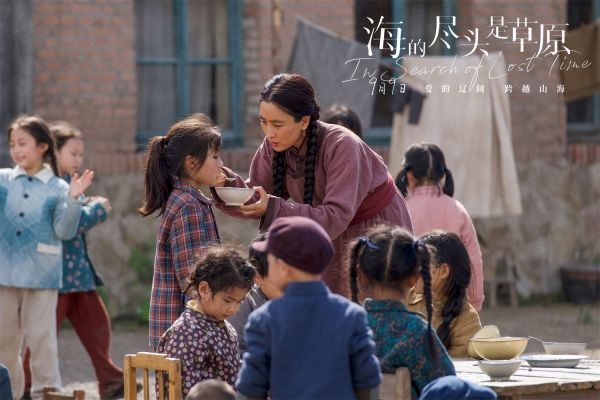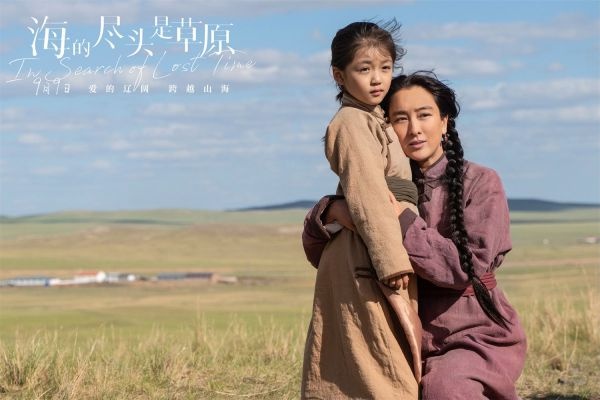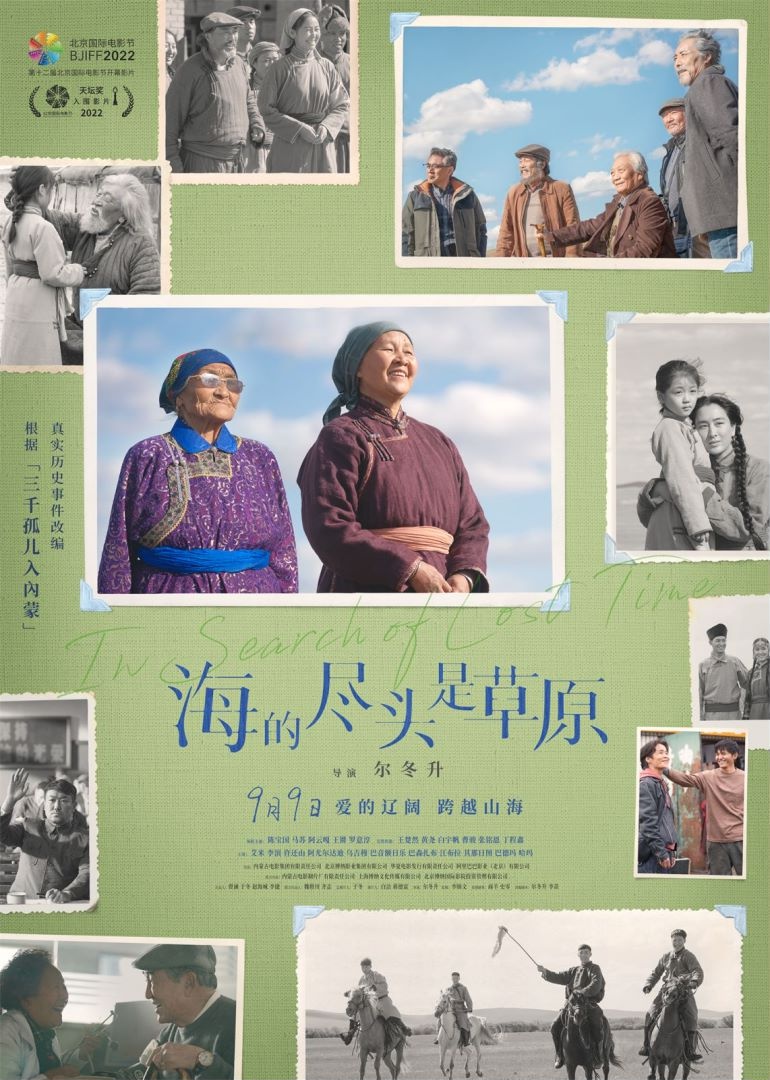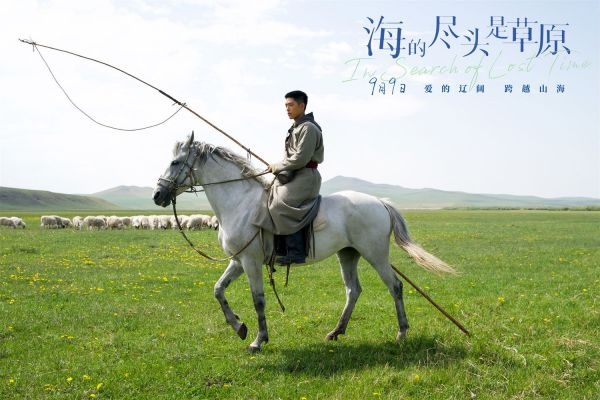60 years ago "Three Thousand Orphans Entering Inner Mongolia", director Er Dongsheng reproduced the grassland love
Author:Changjiang Daily Time:2022.09.10
The Yangtze River Daily Da Wuhan Client September 10th (Reporter Wan Xuming) "Take one, live one, and strong". This is the promise made by the Inner Mongolia Prairie to the south in the late 1950s. On the 9th, the movie "The End of the Sea is the Grassland" was released. Director Er Dongsheng brought the true history of "three thousand orphans into Inner Mongolia" to the big screen. In an interview with the film's main creator, many people are not familiar with this history. I hope to let everyone understand the touching stories of blood and mutual assistance through movies.
From the "child of the country" to the "children in the grassland", the historical details are truly restored

The film "The End of the Sea is the Grassland" is adapted from the real event of "Three Thousands of Orphans into the Inner Mongolia": in the late 1950s, New China suffered serious natural disasters, and a large number of orphans southern orphans faced a crisis of insufficient nutrition. At this juncture, the Party Committee and Government of Inner Mongolia Autonomous Region actively asked the central government to take the principle of "take one, live one, and strong". Nearly 3,000 orphans received it on the prairie and gave it to the simple and kind herders for adoption. This group of orphans far away from family members and hometown has become the "child of the country". In the simple love of herders, they eventually become "children in the grassland."

Like many people, Er Dongsheng once "know nothing" about this history. To this end, he led the main creation team to collect and study a lot of relevant information, read the relevant film and television works, books and literature that could be found at hand, and also visited a number of people of the year. Details such as the qualification review of the adopted family and the respect for the children's willingness are all real restoration of that period of history.
After some visits, Er Dongsheng discovered: "'Three Thousand Orphans' is just a noun. The number we see is that there are nearly 30,000 to 50,000 people in the end. Many provinces have children. Shock. I hope this film can be moved to the audience and let everyone understand the story of the blood and mutual help. "
In the film, the father of the grassland is played by A Yunga. In the Inner Mongolia ethnic group, he recalled: "Looking back, in fact, our hometown also has adopted people. At that time It was a child from far away. They came to the grassland and everyone lived together naturally. There was nothing different. "He said:" As a Mongolian, I was proud of the people who adopted the orphans at the time. The grassland generally has a wide heart and mind. In such a time, I believe that there will be such a group of people anywhere in China, and everyone will do it. "
Animals, children, Mongolian ... The big problem of filming, all met

There are several recognized problems in filming: animals, children, dialects. "The End of the Sea is the Grassland" all encountered. The film is intertwined with two clues: history and reality. In the historical part, the "orphans" are younger than home and adapting to the grassland life. In the pastoral areas more than half a century ago, riding, shepherds, cattle, and even avoiding wolves are part of life. Of course, a considerable part of the role needs to be performed in Mongolian.
The drama in the orphanage made Er Dongsheng "collapse". "When there are too many children, you roar no use. You have to start shooting. The deputy director shouted with the big horn. In 10 seconds, the noisy voice began again. After the filming, the kindergarten teacher admired it very much. "

In addition to a large number of riding dramas, the film also challenged the "most difficult cattle", which made Er Dongsheng teach "the temper". In the film, the two wolves in the film attacked the sheep and children's drama. They actually used real wolves. One of the wolves biting the wood was played on the spot and captured the scene.
As for the problem of Mongolian, the actors were solved. Masu played the grassland in the film and had no reservation love and tolerance, which caused her to influence the little thorn in the "orphan". Masu lived in the prairie for 4 months in advance, and he carried more than 100 Mongolian words under the hard back, and felt "the quietness, simplicity, enthusiasm and freedom of herders."
Chen Baoguo is "Dinghai God Needle", and A Yunga "becomes a character when the horse goes up"

"The End of the Sea is the Grassland" is the main line of the southern girl Du Sihuan and the grassland family. It is intertwined with the twin brother Du Sihan to go to the grassland to find her sister's clue 60 years later. In this group of plays, each character has its own story. When Du Sihan was about to end his life, he decided to take over his mother to find his sister, repenting, nostalgic, and pursuing blending in his heart. Prairie Erji, Ah, and Brother's endless love for "daughter" will not hesitate to protect each other, but when facing the loss, there will be anger and tangling. The first half of Du Sihuan was trapped in the doubt and perseverance of "abandoned".

The elderly Du Sihan was played by Chen Baoguo, a "old drama bone", and Er Dongsheng described him as "Dinghai God Needle. There are not many plays, but it has brought stability to the whole scene." The father of the grassland is played by A Yunga. Although there are Mongolian status, from the cross -border of the musical actor to the movie, they also have to play a soldier father with a personality. With the Mongolian -unique way of riding, crooked and spanned, the special man. I think I chose the right person, and he has become that role completely. "For Masu, who played the mother of the grassland, Er Dongsheng bluntly said" thanks " And ridicule saying that "Mongolian is a language that I can't learn, grammar is very difficult, and she is really not easy to learn."
A Yunga said: "The mother on the grassland is great, they are kind and selfless, and their eyes are simple. What we want to pass on is the kind heart." [Editor: Deng La Xiu]
For more exciting content, please download the "Da Wuhan" client in the major application markets.
- END -
"Lone Moon": When a comedy film has a scientific consultant

◎ Write 丨 Science and Technology Daily reporter Zhang Gelun◎ Planning 丨 Liu Li...
The "Sober Earth" in "Star Han", the third uncle and mother, have too many classic characters that have performed

Sang Shunhua, the uncle of Star Han, was named Sober on the World by netizens. At ...